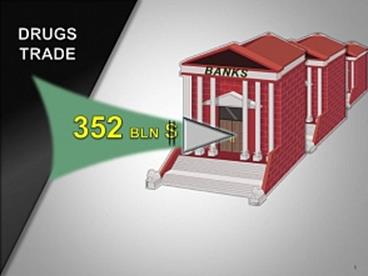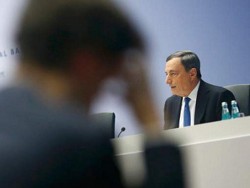
The Central Bank is the most important institution that performs the functions of issue of cash, control over private banks, the conduct of monetary policy in the country. In terms of impact on the economy Central Banks can outperform all departments of the economic bloc of the Executive, including ministries of Finance (Treasury).
Central banks are not included in any of the three branches of government (legislative, Executive, judicial). In the constitutions and special laws that is fixed by their special status, making them independent from the state. They say that this independence is necessary in order to conduct prudent monetary policy. Say, the independence of Central banks need to ensure that the state could not abuse the printing press and to cover their expenses with the unsecured money issue. Today, however, this argument prefer not to remember, because Federal reserve (US Central Bank), the Bank of England, Bank of Japan, European Central Bank and other Central banks of the Western world switched on their printing presses at full capacity, covering this activity links to “quantitative easing”.
The pyramid of financial power
Today it is obvious that in parallel with the state machine existing for many centuries, and embody the national sovereignty in the world built new construction that is designed to gradually replace nation-States. Its called world government, and the main pillars of this design are the Central banks. The design has the form of a pyramid. At the top is the Federal reserve system of the USA, which produces the dollars, received the status of world currency 72 years ago at an international conference in Bretton woods.
The next level of the pyramid – the Central banks issuing reserve currency. It is primarily the European Central Bank (ECB), the Bank of England, Bank of Japan. On the floor below there are Central banks outside the Euro zone and acting as a kind of the shareholders of the ECB (main among them – the Bundesbank and Bank of France). Here are the Central banks of Canada, Australia, New Zealand, some Scandinavian countries. The base of the pyramid – the vast majority of the rest of the Central banks of the world, which are such only nominally. In fact, this “monetary authority” that issues the national currency by purchasing U.S. dollar or other reserve currencies. In fact, the “national” money – only repainted the dollars the Federal reserve. Conducting all the community of Central banks, the fed and the Bank for international settlements (BIS) in Basel. BMR – a kind of private club of Central banks created in 1930 and played a significant role in the preparation and outbreak of the Second world war.
Central banks may have the status of public organizations, private or mixed (public-private). Form of ownership does not affect their “independence”. For example, the Federal reserve – a private Corporation of closed type. The Bank of England and Bank of France were private, but was later nationalized. The Central banks of Japan and Italy are organizations with a mixed property. Every year Central banks expand the range of its functions and powers. Many become “financial megaregulators”, usurping control over the economy and transforming the ministries and departments of the economic bloc of the Executive in purely decorative institutions.
Some of the events happening in the world can be understood only taking into account the fact that the Central banks have immunity that protects them from any attempt by States to encroach on their “special” status.
Slovenia puts ECB into place
July 7, international Agency distributed two news. The first source of news was the BBC company, a second source – Reuters. The air force has named his report as follows: “the Court has frozen the assets of former President of Argentina Kirchner”. Reuters filed its news titled “ECB threatens Slovenia to court for searches of the regulator.” At first glance, the news are not connected. Nevertheless, the connection between them exists.
In 2013, one of the leading private banks in Slovenia was on the verge of bankruptcy. The collapse of the Bank could bring down the entire banking system of the country. The government of Slovenia that is a member not only of the European Union and the Eurozone, not receiving adequate financial support from Brussels, was forced to bail out their own banks, issuing for this purpose from the budget more than 3 billion euros. The distribution of public money on the basis of those recommendations and proposals that were prepared by the Central Bank of Slovenia. And now three years later there is strong evidence, casts doubt that the Central Bank has provided the government with an objective picture of financial situation of the individual banks included in the credit system of the country. Suspect the presence of corruption in the information that the Central Bank of Slovenia provided to the government. The Slovenian police have raided the offices of the Central Bank and seized a number of documents, compromising the management of the Bank of Slovenia.
And suddenly the actions of the Slovenian police had caused a furious reaction from the European Central Bank. The question took on control the head of the ECB, Mario Draghi. He said that he condemns the seizure of property and information and called it a violation of the legitimate rights and immunities of the ECB. He called on European Commission President Jean-Claude Juncker to understand the situation. Mario Draghi also sent a letter to the Prosecutor General of Slovenia, which reads as follows: “the Seized devices contain information of the ECB, and such information is protected in accordance with EU legislation.” The European Central Bank has threatened Slovenia with a lawsuit (of course, the lawsuit will be filed in the national court of Slovenia, and in the supranational European court of justice). It turned out that any attempts by national authorities to control their Central banks qualifies automatically as an encroachment on the independence of the European Central Bank. Slovenian history has demonstrated the authorities of all European countries in the Eurozone that their “national” Central banks – in fact, only branches of the supranational ECB.
Home money revenge the woman
Now about events in Argentina. A court in Buenos Aires has decided to freeze the assets of former President of Argentina Cristina Fernandez de Kirchner, which is charged with that in the last months of his presidency, she was manipulated by the Central Bank of Argentina, in order to artificially support the exchange rate of the Argentine peso. At the direction of Cristina Kirchner, the regulator allegedly sold U.S. dollars on the futures market at “a lower price to the detriment of the financial system of the country.” The custom-made nature of the case, which the court “sews” the former President, no doubt. This strong woman for many years resisted the onslaught from the US and masters of money defending the sovereignty of Argentina.
First, it resisted the attempts to “financial vultures” to destroy the agreement on debt restructuring of Argentina, which was reached in early 2000-ies with the main creditors. In total the debt burden of the country then managed to cut about $ 100 billion. “Financial vultures” (some speculative investment funds) that have not signed the restructuring agreement began to operate through the courts in new York, achieving 100-prozentige of debt repayment on Argentine securities, which they were able to buy on the market at “junk” prices. A precedent was set not only the destruction of the global agreement on sovereign debt restructuring. There was a precedent of blatant pressure on other States through decisions of courts from other jurisdictions (courts, which did not formally have the status of international). Here Cristina Fernandez de Kirchner was at the forefront of the fight against legal imperialism.
Second, Cristina Kirchner a few years ago has created a bad for the owners of the money precedent. She’s like the head of state has decided to put control of the Central Bank of Argentina. In 2010, it took foreign exchange reserves of the Central Bank for foreign debt payments of the country. It was about the amount of 6.6 billion. which was about 1/7 of the international reserves of the Central Bank and half of the total sovereign external debt. When you cover the state debt by obtaining foreign loans, the country increasingly immersed would be dependent on the world’s usurers. When using reserves of the Central Bank in Argentina in a short time could completely get rid of external indebtedness. Not hard to imagine how the financial international has responded to a similar attempt brave women. The then President of the Central Bank of Argentina Martin Redrado refused to execute the orders of Cristina Kirchner and she has signed the decree about the dismissal of Redrado. In response, Redrado filed a lawsuit in the court of Buenos Aires, and after a couple of days (what efficiency!) Argentine court reversed the decree of the President of the country. The judge who led the case, explained its decision by saying that “the President has no authority for making a decision on the resignation of the head of the Central Bank.
Surprisingly, the court not only accepted the decision about the restoration of Redrado as President of the Central Bank, but also demanded cancellation of the decision of the President of Argentina about the use of international Central Bank reserves to repay debt.
In the end, President of the National Bank of Martin, Redrado managed to fire, but the decision to ban the use of international reserves of the Central Bank was upheld. It is noteworthy that in January 2010 the National Bank of Argentina in U.S. banks were frozen by court in new York. The decision was made on the basis of requirements of creditors-holders of the external debt of Argentina. Formally, the decision of the new York court was not connected with the decision of Cristina Kirchner. However, experts who know the rules of the game in the global financial system, I believe that it was a warning of financial international President of Argentina. I believe that it was a reminder to those countries that Finance international is obliged to accumulate foreign currency reserves and print their “national” banknotes only secured by pieces of paper called “dollar” or “Euro”. Only given this history you can understand why today began the prosecution of a former President of Argentina Cristina Kirchner. Home money tend to completely destroy the traces of the “Argentine precedent” for the removal of the Central Bank from the control of the world financial international.








